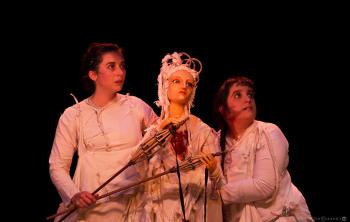

The theater and puppet mandrake was founded in 2002 and its artistic origins is a symbiosis of a symbolic language, which combines heritage, the traditional legacy, thought and contemporary universe, not always peaceful arises a key element, the puppet .
The company has a roaming component at national level but also international. It has always been an initial choice?
Clara Ribeiro: For now we bet in this international dimension, because we want to show our work around the world. Then there is the company's own language the way we have been developing speaks a lot about the tradition and Portuguese identity. We want to somehow show the best of what we have in our country, this side of the traditional root, folklore and worked that way because in some way we see the world thus traveling for work. We have some pieces built specifically for the internacional tour and are very portable as of this "adormecida" is a 2012 show and was purpose-built for the capital of culture of Guimarães, fits into two suitcases, but then turns and It is relatively large up because it has practically no text.
You said the fact that this show fits in two suitcases and has Portuguese roots, it has always been the idea of adding a national component the issues addressed?
CR: The company has only 13 years and initially we were in search of language so we research a Romanian legend, called "the mill of Califar," but then we were finding very similar points with the Portuguese traditional legends, especially from the North who speak of pacts with the devil, there is also a miller and we were finding many things in common. In 2008 we thought the "lenheiras of cuca Macuca" a language that meets the Portuguese legends that are linking this traditional aspect with the contemporary, but always with this very Portuguese nature.
So how do you carry out this research? How does take place all this creative process?
CR: Well, in the company's core there is me, Clara Ribeiro and Filipa Mesquita who are the artistic directors and the plastic direction is enVide neFelibata somehow while directors have some needs to work a theme, something in particular and we propose these ideas, that are not developed soon, but after a few years later is performed. The theater project will be directed by me, or by Filipa and that's how we been running the company language. Filipa has over this side of the root and working traditions. I also like to work this issue, has times when we do, but also I like to address the society we live in as individuals I even have a project that talks about domestic violence and appreciate to seek this social side in my work.
It is curious that you mention that fact because the research that I performed I found that this is not a company that produces only children's theater.
CR: No, indeed.
It is a theater for everyone.
CR: Exactly. Of course, the puppet is associated with children and we do not run away often to this feature because we are not a subsidized company and most of our audience at least in Portugal are children, but also do shows only directed at an adult audience. The "adormecida" for example, is for all ages, children can draw from this history and the adults take other things, we talked here of the spinners and kids do not know what it is, we will pursue it in the memories of adults who perhaps knew the grandmothers who spun and children have not lived with this reality.
How does the foreign audience looks at your shows with themes such as Portugal? What is the feedback?
CR: I think somehow people are surprised, for now, because we have a work in which there is always a relationship between the actor and the puppet, in addition to the theme that people identify as very Portuguese, presented various techniques very distinct, mix them, this show, for example, have some balls that ultimately are trees, we have a giant puppets and a puppet who comes up with the mechanism on the eye, which is very realistic, that is, people will be surprised with the very variety and aesthetics of the shows and not only the subject, but all the plastic language of the shows.
Still it is difficult for a company like yours that cannot dispose of any public support?
CR: Yes, for us it is difficult, but we are a company with a constant work over 13 years and somehow we tour a lot and we feel that we have some recognition, neither government nor state so far had occasional support for international tours but we do not support an annual or biennial bases. We live, in other words, the company remains by the fruit of our work, but, for example, feel the recognition of the public feel that warmth and recognize the puppet mandrake. In fact, we have several people who do not believe as we do not have no state support given our regular work, on average debut three shows, or four annual productions, more exhibitions, training and educational and the community service, where we develop a very strong work.
What then is the next step, after these 13 years in terms of the theater and puppets of mandrake?
CR: We want to continue with this line of work that we found and identified. And yet, we want to build shows with different languages, always bet on this side of the internationalization, because strangely enough the "adormecida" after his international career at national level have made over 50 presentations, which shows that the outside recognition, unfortunately it is still very important in our country (laughs). Also we can keep the interest on our culture and maintain it, get the roots what we really are.
http://www.marionetasmandragora.com/










